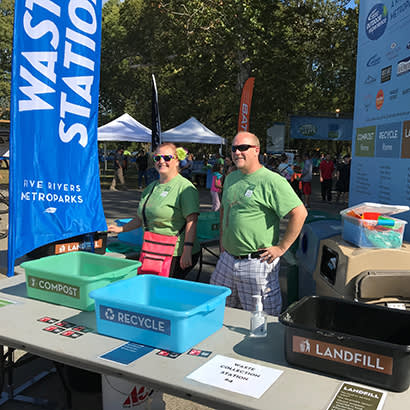
For an enhanced digital experience, read this story in the ezine.
The mission of Five Rivers MetroParks (MetroParks) in Dayton, Ohio, is to protect the region’s natural heritage and provide outdoor experiences that inspire a personal connection to nature. In 2015, MetroParks adopted a Waste Management Policy that specifies agency-produced programs, meetings and events be conducted waste free.
All staffed facilities became equipped with recycling and compost bins, and staff are coached to use these amenities. Mid-sized compost bay systems are used to manage horticultural waste and brush at Possum Creek Farm and Wegerzyn Gardens MetroPark, where they serve as a publicly visible example of how to use compost for gardening and landscaping.
Composting for small programs is straightforward, with foresight to make sure the correct wares are purchased and disposal guidelines are communicated with guests. These efforts become more challenging for large events with multiple food vendors and open attendance, yet MetroParks has been successful in diverting more than 80 percent of the waste stream from the largest staff-produced event, the Wagner Subaru Outdoor Experience.
The Wagner Subaru Outdoor Experience Goes Waste Free
The Wagner Subaru Outdoor Experience is held annually in Dayton during the first weekend in October to celebrate the “Outdoor Adventure Capital of the Midwest.” This weekend-long festival is organized by the MetroPark’s Outdoor Recreation team with assistance from each functional area of the agency and welcomes more than 12,000 visitors from across the country. Visitors enjoy opportunities to experience a variety of outdoor recreation activities, competitions, clinics, local recreation organizations and more.
The festival includes 12 to 15 food vendors, a beer garden, live music and outdoor recreation exhibitors from across the world, so waste is an inevitable byproduct. Since instigating the waste-free initiative, the agency has worked to ensure beer sales are conducted with reusable vessels, free water bottle refilling is provided, and food service vendors use 100 percent compostable service ware, which staff and volunteers collect and process.
Multi-bin waste collection stations supported by trained volunteers are crucial to this initiative to ensure materials are properly collected and sorted. Four public waste collection stations are within the footprint of the event, each surrounded by tables with bus tubs to facilitate convenience for event visitors and avoid cross-contamination. All food waste and service ware are collected as compost, with commingled recycling and incidental trash collected separately. Each stream is kept color coded to ensure it arrives at the right location.
Park staff weigh the materials prior to being transported. Recycling and trash are retrieved for disposal by a contracted hauler, and the compost is then processed in-house thanks to an industrial grinder provided by Montgomery County Environmental Services and a partnership with The Dayton Foodbank, which operates an Ohio Environmental Protection Agency-licensed Class II facility.
Partnerships Enhance the Program
A local service ware supply vendor and compostable ware manufacturer work with food vendors ahead of time and during the festival to make sure compostable wares are correct and able to be restocked. In 2022, Waste-Free Dayton, a nonprofit organization, assisted with collection sites.
Communication with vendors is a key part of a successful waste-free program, and recruitment is most successful when it is framed as a partnership rather than just an opportunity to vend. The effort requires extra work and increases overhead for participating vendors but gives them the ability to learn a new way of doing business that will be increasingly important as other organizers adopt waste free. It also is a marketable attribute for doing business and is of value to small business owners and their customers.
Being waste free requires extra attention to detail, time and/or financial investment, and carefully crafted communication. However, these efforts demonstrate a necessary change that generates goodwill in the community and provides a replicable model to carry forward in the spirit of conservation and sustainability.
Tim Pritchard is Sustainability Manager at Five Rivers MetroParks.

